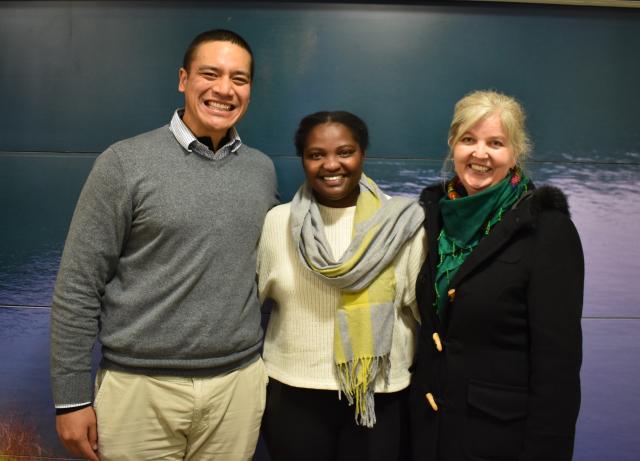
Sophie Conlon
IN celebration of National Refugee Week the Mount Gambier Library hosted a community morning tea where different cultural communities which make Mount Gambier/ Berrin great were honoured.
Library team leader programs Kristi Books said the event, held Thursday, June 22, was a organised to help refugees feel welcome in the community.
“The idea is to make sure our new arrivals feel welcome, feel safe, feel they can use the facilities and get used to seeing a few familiar faces,“ she said.
“It definitely makes the new arrivals feel welcome and we’ve got community members that then feel comfortable in posing some questions, asking about their home life, where they’re from and making our new members feel welcome.
“We’re an inclusive space, so hopefully by them coming down in an informal setting, they’ll feel the opportunity to join in with our regular programs, which will then help them fit into life in Mount Gambier.“
Originally from Congo, Chanceline Kakule came to Australia with her family as refugees in 2010.
They arrived in Tasmania, then moved to Geelong, but have called Mount Gambier/ Berrin home since 2015.
“It’s probably the longest we have lived in one place as a family, the longest I have stayed at one school, the longest of everything really,“ she said.
The 24-year-old said she found the community welcoming, but would sometimes encounter racism and ignorance.
“It wasn’t as diverse as when I came so I would find myself in situations where an educational moment was needed to further educate of where I come from,“ she said.
“I look back, and how it is now it’s so diverse this place, I found it so accepting.“
Ms Kakule said more events like this were needed in the community as it highlighted the experiences refugees had and how Australia is a safe place.
“It’s really nice to just have something like this so we can all get together and reflect,“ she said.
“It can be traumatising for people who have gone through those experiences, whether it’s persecution or war, however it’s moments [like this] that provide education and understanding for those who have not, and maybe a wake up call just to reflect on our own lives and say ’There are people that have gone through worse and they’re living amongst our community, what can we do to support them?’.“
Despite finding Mount Gambier/ Berrin diverse and welcoming, Ms Kakule said she did experience racism sometimes in the community and thought it was important to educate people on how their actions were felt.
“When we speak about racism that’s a very big taboo topic, but it happens around us and sometimes it happens in ways that we don’t notice, but it is alive,“ she said.
“It’s important to educate people on where we come from, what we’ve been through, what the journey has been like, bridge those gaps and say ’hey, we’re all the same,’.“
Survivors of Torture and Trauma Assistance and Rehabilitation Service (STTARS) South East regional coordinator and counsellor Sophie Coote said events like this one helped highlight the richness that people with refugee experiences brought to the region.
“It’s really important and really great any time we get an opportunity to get together to recognise those in our region who do have really difficult past experiences and that they’re living their life to the fullest and best,“ she said.
The event saw several communities come together, including Mount Gambier Police, the Migrant Resource Centre, STTARS, Mount Gambier Library and people with different refugee experiences.
Ms Coote said this was a perfect example of working together for the good of the region.
“Coming together like this, it’s a bit of a cliché, but it’s like one big happy family, but there’s also opportunities to meet local people that perhaps we are not aware of that are volunteering their time in the community to support new arrival families,“ she said.
“When we put our heads together it’s amazing what we can achieve and what we can do.“
She said coming together also helped different communities understand each other in a safe environment.
“We support people in understanding that someone can have a really deep fear response to someone in uniform and they might not be able to speak. But that’s not because they are being a nuisance or annoying, it’s because of their deep trauma that they’ve been through,“ she said.
“So helping the community to understand those sorts of behaviours really helps people to understand what people have been through, but also just be that little bit more knowledgeable that people may react a certain way when they are really really scared because terrible things have happened in their past.“







